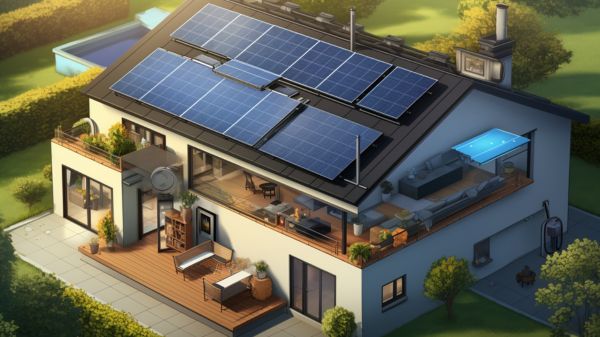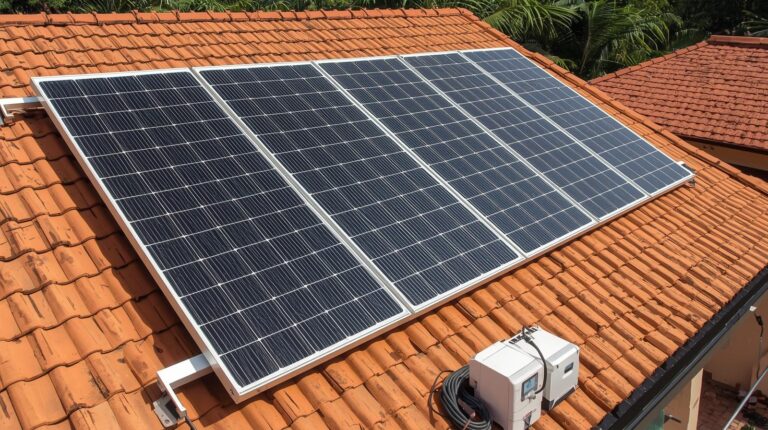Looking to optimize your solar energy system? Look no further. This article provides you with 12 expert tips for improving the efficiency of your solar panels. From optimal panel placement to smart energy storage, we’ve got you covered. With our technical and analytical approach, you’ll gain the knowledge and tools needed to make the most of your solar energy system. So, let’s dive in and start harnessing the power of the sun like a pro.

Key Takeaways
- Proper solar panel orientation and strategic placement in areas with unobstructed access to sunlight maximize energy production.
- High-efficiency solar panels convert more sunlight into electricity, resulting in higher energy output and greater savings on electricity bills.
- Upgrading inverter technology improves energy conversion efficiency and system performance.
- Regular maintenance, cleaning, and the use of energy-efficient appliances enhance solar energy system efficiency.
Optimal Panel Placement
To maximize the efficiency of your solar energy system, consider the ideal placement of your panels.
Proper solar panel orientation and shading analysis are crucial factors to consider when determining the best location for your panels.
Solar panel orientation refers to the direction in which your panels are facing, typically either towards the south or north, depending on your geographical location. South-facing panels receive the maximum amount of sunlight throughout the day, optimizing energy production. However, north-facing panels can also generate energy efficiently in certain situations.
Additionally, shading analysis is essential to identify any potential obstructions that may cast shadows on your panels, such as nearby trees or buildings. By placing your panels in an area with minimal shading, you can maximize your solar energy production and ensure the optimal performance of your system.
Maximize Sunlight Exposure
To maximize sunlight exposure for efficient solar energy, consider optimal panel placement and advancements in sun-tracking technology.
Properly positioning solar panels is crucial for capturing the maximum amount of sunlight throughout the day. By strategically placing panels in areas with unobstructed access to sunlight, you can enhance their performance and overall energy production.
Additionally, advancements in sun-tracking technology allow panels to follow the sun’s path, optimizing their exposure to sunlight and increasing efficiency even further.
Optimal Panel Placement
Maximize the sunlight exposure of your solar panels by regularly adjusting their placement throughout the day. To ensure optimal panel placement, it is important to conduct a shade analysis of your property. Identify any obstructions, such as trees or buildings, that may cast shadows on your panels and adjust their positioning accordingly.
Additionally, consider the installation of micro inverters, which can improve the efficiency of your solar system by mitigating the impact of shading. These inverters work at the panel level, allowing each panel to operate independently, even if one panel is shaded.
By strategically placing your solar panels and utilizing micro inverters, you can maximize the amount of sunlight your panels receive, leading to increased energy production and greater overall efficiency.
| Advantages | Disadvantages |
|---|---|
| Increased sunlight exposure | Initial cost of shade analysis |
| Improved energy production | Potential need for panel repositioning |
| Greater overall efficiency | Additional cost of micro inverter installation |
| Enhanced return on investment | Maintenance and monitoring requirements |
Sun-Tracking Technology Advancements
By implementing sun-tracking technology advancements, you can optimize the exposure of your solar panels to sunlight. This allows for increased energy generation and improved efficiency. Here are some key points to consider:
- Solar panel orientation: Sun-tracking technology enables your panels to follow the sun’s path throughout the day, ensuring maximum sunlight exposure. This helps in capturing more solar energy and generating more electricity.
- Tracking device efficiency: Advancements in tracking devices have made them more accurate and reliable. These devices use sensors and motors to adjust the position of the panels, ensuring they’re always facing the sun.
- Enhanced energy production: With sun-tracking technology, your solar panels can produce more electricity compared to fixed panels. This means you can generate more renewable energy and reduce your reliance on traditional power sources.
- Increased return on investment: By maximizing sunlight exposure, sun-tracking technology can enhance the overall performance and efficiency of your solar system. This leads to a higher return on investment and quicker payback period.
Implementing these advancements in sun-tracking technology can significantly improve the performance of your solar panels, allowing you to harness more clean and sustainable energy.
Choose High-Efficiency Solar Panels
When it comes to choosing solar panels, it’s crucial to consider their efficiency and cost. Higher efficiency panels can convert a greater amount of sunlight into electricity, resulting in a higher energy output. However, it’s important to strike a balance between efficiency and cost, as panels with the highest efficiency may also come with a higher price tag.
Panel Efficiency and Cost
To achieve the highest level of efficiency and cost-effectiveness in your solar energy system, opt for high-efficiency solar panels. These panels have several advantages that make them a smart choice for your renewable energy needs:
- Longer panel lifespan: High-efficiency solar panels are built to last, providing you with reliable and consistent energy production for years to come. This means fewer maintenance costs and a higher return on your investment.
- Increased energy output: High-efficiency panels are designed to convert more sunlight into electricity, maximizing your system’s energy generation potential. This translates into greater savings on your electricity bills.
- Government incentives: Many governments offer incentives and rebates for installing high-efficiency solar panels. Taking advantage of these programs can significantly reduce the overall cost of your solar energy system.
- Reduced environmental impact: By choosing high-efficiency panels, you’re reducing your carbon footprint and contributing to a cleaner, more sustainable future.
Investing in high-efficiency solar panels not only makes financial sense but also aligns with your desire to belong to a community that values renewable energy and environmental stewardship.
Impact on Energy Output
To maximize your solar energy system’s energy output, choose high-efficiency solar panels that convert more sunlight into electricity.
The impact of using high-efficiency solar panels on energy output is significant. These panels are designed to capture a larger amount of sunlight and convert it into usable electricity with greater efficiency.
By optimizing energy output, high-efficiency solar panels can generate more power, allowing you to meet your energy needs more effectively. This is particularly important in areas with limited sunlight or during times of peak energy demand.
The higher efficiency of these panels means that you can generate more electricity from the same amount of sunlight, reducing the need for additional panels and saving you money in the long run.
Regular Maintenance and Cleaning
Regular maintenance and cleaning are essential for optimizing the efficiency of your solar energy system. By following proper cleaning techniques, you can ensure that your solar panels are free from dirt, dust, and debris, allowing them to absorb maximum sunlight. Here are some tips to help you maintain and clean your solar energy system:
- Regularly inspect your solar panels for any signs of damage or deterioration.
- Use a soft cloth or sponge with mild soap and water to gently clean the surface of the panels.
- Avoid using abrasive materials or harsh chemicals that could scratch or damage the panels.
- Remove any leaves, branches, or other obstructions that may be blocking the sunlight from reaching your panels.
Taking the time to regularly maintain and clean your solar energy system won’t only improve its efficiency but also extend its lifespan, ensuring that you continue to enjoy the benefits of clean and renewable energy for years to come.
Implement Smart Energy Storage
One way to optimize the efficiency of your solar energy system is by implementing smart energy storage. By utilizing a smart battery and implementing effective energy management techniques, you can ensure that excess energy generated by your solar panels is stored efficiently for later use.
This not only maximizes the utilization of your solar energy system but also ensures that you have a reliable and consistent power supply. To help you understand the benefits of smart energy storage, here is a comparison table showcasing the advantages of implementing this technology:
| Traditional Energy Storage | Smart Energy Storage |
|---|---|
| Limited storage capacity | Increased storage capacity |
| Inefficient energy management | Efficient energy management |
| Lack of real-time monitoring | Real-time monitoring and control |
| High maintenance requirements | Low maintenance requirements |
| Limited lifespan | Longer lifespan |
Upgrade Inverter Technology
To improve the efficiency of your solar energy system, upgrading your inverter technology is crucial.
By maximizing inverter efficiency, you can enhance the conversion of DC power from your solar panels into AC power that can be used in your home or fed back into the grid.
This upgrade will optimize the energy output of your system, ensuring that you make the most of the sunlight available and maximize your return on investment.
Inverter Efficiency Maximization
Upgrade your inverter technology to maximize its efficiency and improve your solar energy system’s overall performance. Inverter efficiency testing is crucial for determining the effectiveness of your inverter. By upgrading to the latest technology, you can achieve higher efficiency levels, resulting in increased energy production and cost savings.
Here are four reasons why upgrading your inverter technology is essential:
- Enhanced performance: Upgrading your inverter technology allows you to optimize its performance, ensuring that it operates at its highest efficiency levels.
- Improved reliability: Newer inverters are designed with advanced features that enhance their reliability, reducing the risk of system failures and downtime.
- Greater monitoring capabilities: Upgraded inverters often come with enhanced monitoring capabilities, allowing you to track and analyze your system’s performance in real-time.
- Compatibility with future upgrades: Upgrading your inverter technology ensures compatibility with future system upgrades, allowing you to take advantage of new features and advancements.
Enhanced Energy Conversion
To further optimize the performance of your solar energy system, regularly upgrading your inverter technology is key. By doing so, you can consistently improve the efficiency of energy conversion, ensuring maximum output from your system.
Enhanced energy storage and solar panel design are two important factors to consider when upgrading your inverter technology.
Enhanced energy storage allows for better utilization of the energy generated by your solar panels. By upgrading your inverter technology to support advanced energy storage systems, you can store excess energy during the day and use it during times of low solar radiation or at night. This ensures that the energy generated by your solar panels isn’t wasted and maximizes the overall efficiency of your system.
Additionally, upgrading your inverter technology can also improve the compatibility and integration of your solar panels with the grid. Advanced inverter technology allows for better synchronization and optimization of energy flow between your solar panels and the grid, ensuring that you can make the most of the energy generated by your system.
Utilize Solar Tracking Systems
To maximize the efficiency of your solar energy system, consider utilizing solar tracking systems. These systems are designed to move solar panels throughout the day, ensuring they face the sun at all times. This technology offers several benefits that can significantly improve the efficiency of your solar energy system:
- Increased Energy Production: Solar tracking systems allow panels to capture more sunlight throughout the day, resulting in higher energy production.
- Optimal Angle Adjustment: By tracking the sun’s movement, solar panels can be adjusted to the optimal angle for maximum energy absorption.
- Longer Operational Hours: Solar tracking systems extend the operational hours of solar panels by capturing sunlight from dawn until dusk.
- Improved Return on Investment: The increased energy production from solar tracking systems can lead to faster payback periods and greater overall financial benefits.
Invest in Energy-Efficient Appliances
To further boost the efficiency of your solar energy system, consider investing in energy-efficient appliances. Energy-saving appliances can significantly reduce your energy consumption, allowing you to maximize the benefits of your solar power system.
When choosing appliances, look for those with the ENERGY STAR label, as they’ve been certified to meet strict energy efficiency standards. These appliances use less electricity, which means less strain on your solar panels and more savings on your energy bills.
In addition to energy-saving appliances, consider using energy-efficient lighting options such as LED bulbs. LED bulbs use up to 75% less energy than traditional incandescent bulbs and can last up to 25 times longer.
Improve Insulation and Weatherization
Improve the insulation and weatherization of your home to enhance the efficiency of your solar energy system. By implementing effective insulation techniques and exploring weatherization alternatives, you can create a more comfortable and energy-efficient living space.
Here are some key strategies to consider:
- Seal air leaks: Identify and seal any gaps or cracks in your walls, windows, and doors to prevent air leakage and maintain a consistent indoor temperature.
- Upgrade insulation: Enhance your home’s insulation by adding or improving insulation in the walls, attic, and floors. This will help reduce heat transfer and improve energy efficiency.
- Install energy-efficient windows: Consider replacing your old windows with energy-efficient ones that have double or triple panes and low-emissivity coatings to minimize heat loss or gain.
- Utilize weatherstripping: Apply weatherstripping around doors and windows to create a tight seal and prevent drafts.
Implementing these insulation and weatherization measures won’t only optimize the performance of your solar energy system but also make your home more comfortable and reduce energy costs.
Consider Solar Water Heating
Enhancing the efficiency of your solar energy system can be achieved by considering solar water heating.
Solar water heaters utilize the sun’s energy to heat water for domestic use, such as showers and washing dishes. These systems typically consist of solar collectors, storage tanks, and a circulation pump.
The solar collectors capture the sun’s rays and transfer the heat to the water in the storage tank. By using solar water heaters, you can reduce your reliance on traditional water heating methods, which often require fossil fuels. This not only helps to reduce carbon emissions but also leads to significant energy savings.
In fact, studies have shown that solar water heaters can reduce water heating costs by up to 80%. So, if you’re looking to maximize the efficiency of your solar energy system, consider incorporating solar water heating to enjoy both environmental and financial benefits.
Opt for Net Metering Programs
Consider participating in net metering programs to maximize the efficiency of your solar energy system and take full advantage of its benefits. Net metering is a policy that allows you to sell any excess electricity your solar panels generate back to the grid.
Here are some reasons why net metering programs are beneficial:
- Financial savings: By selling excess electricity, you can offset your energy costs and potentially even earn credits or receive payment for the energy you produce.
- Environmental impact: Net metering encourages the use of renewable energy sources, reducing reliance on fossil fuels and decreasing greenhouse gas emissions.
- Energy independence: With net metering, you can generate your own clean energy and reduce your dependence on traditional energy sources.
- Flexibility: Net metering regulations vary by state, but many programs offer flexible options for homeowners, allowing them to choose the best fit for their energy needs.
Monitor and Analyze Energy Consumption
To ensure the optimal performance of your solar energy system, you need to actively monitor and analyze your energy consumption. Energy consumption analysis is a crucial step in identifying areas where efficiency can be improved and costs can be reduced.
By monitoring your energy consumption, you can identify patterns and trends that can help you make informed decisions about your solar energy system. There are various energy monitoring techniques available, such as smart meters, energy monitoring apps, and data loggers, that can provide you with real-time data on your energy usage.
These tools can help you track your energy consumption on a daily, weekly, or monthly basis, allowing you to identify any inefficiencies or areas for improvement. By regularly analyzing your energy consumption data, you can optimize the performance of your solar energy system and maximize your savings.
Conclusion
To maximize the efficiency of your solar energy system, follow these expert tips for improvement.
- Optimal panel placement and maximizing sunlight exposure are crucial, as is choosing high-efficiency solar panels.
- Regular maintenance and cleaning, along with smart energy storage and improved insulation, also play a significant role.
- Additionally, considering solar water heating and participating in net metering programs can further enhance your solar energy system.
- By monitoring and analyzing energy consumption, you can continuously optimize your system’s performance.
- Did you know that implementing these strategies can increase solar energy efficiency by up to 30%?




